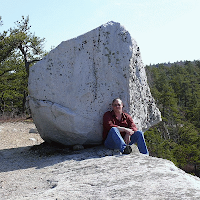Burns is described as an "award-winning educator and author of many math storybooks for children grades two to eight." Unfortunately, education is one of those fields that is rife with a lot of unsubstantiated nonsense and those of us who teach know that educational fads come and go with the regularity of clockwork. Like many who seek to "solve" problems in education, Burns relies heavily on anecdotal evidence and her claims lack the support of peer-reviewed research. I remain skeptical of a number of her claims.
Much of her book I agree with. Many, if not most people, will claim to dislike math and some even claim to be paralyzed with fear at the thought of working with an equation (I've had students like that in my classes). Some claim it's even a disability and students have tried to be excused from math because of it (full disclosure here, I do have to admit to not having much patience with emotionally-disturbed people with phobias - that's why I studied rocks and didn't become a social worker - I'd be like Gunney Ermey in the Geico commercial).
I also recognize that math education in this country is lousy (although I could say the same about English, history, science, etc.). Most students coming into our community college take placement exams that put them into math courses which essentially cover high school math material all over again. When you think something sucks you typically don't invest much effort into learning it (unless, apparently, you have an Asian mother!).
Recognizing that not everyone needs high-level math skills, what should students learn? We wrestle with this issue at the community college where I teach. What course should humanity and some social science majors be required to take as a terminal math course? (We're part of the State University of New York system which requires everyone to have a general education course in mathematics). We currently have an algebra-light type of course filling that role but many, including myself, thinks we need to develop more of a math-literacy type course covering basic algebra as well as topics in statistics, practical things like understanding compounding interest, and maybe even some math appreciation (history of mathematical ideas, topics in number theory, famous unsolved problems, etc).
Burns argues that practical applications of math should be stressed and students should be able to "play around" with math and work in groups to "discover" things. While I do think this can work with a skilled teacher and a good class of kids, I think it's impossible for an overworked teacher in a crowded classroom with a handful of disruptive students (in other words, a typical American urban classroom). The problem is also that while you may be teaching practical math applications to students needed them for getting by in life, other students who may want to go on in math and science may be disadvantaged by not having the basic math concepts and skills in place when taking higher level courses (ask any college math teacher if they think basic algebraic skills are important in calculus class!). I actually think the real solution is to get rid of the crazy notion that all high school students should go to college and different tracks for different students - some students will make far more money and have more job satisfaction from being an electrician, for example, than they would struggling through college for a relatively useless liberal arts degree in communications (sorry all you communications majors our there).
One issue where I think Burns is completely mistaken is in the early use of calculators and the negative attitude toward rote learning and memorization. She believes calculators should be introduced early and rote learning and memorization avoided in favor of . She did give one example that horrified me as much as it did her - an elementary-school student once told her something like "Going fishin', got no bait, six times eight is forty eight." Her reply to the student was "Very good. Do you know six times nine?" and the student said "No, we haven't learned that rhyme yet." At first I thought that this was an aberration, no teacher would teach kids the multiplication table by coming up with 144 rhymes (which would be awfully easy to confuse as well, why not "six times eight is thirty eight"?). This kind of technique presents math as something mysterious and arbitrary which the multiplication table certainly is not. Then I found out from my wife that at least some math teachers do use this method in our local elementary schools. No wonder most of our incoming college students are clueless about math.
For homeschooling our children, my wife and I use Saxon Math since they have an integrated curriculum from Kindergarten through Calculus. Saxon is known for being rigorous and relying heavily on repetition. I'm insisting that my kids memorize the multiplication tables up through 12. It's not exciting and sometimes they don't want to do math. As their math skills increase, however, I'm trying to introduce them to higher level concepts that I think are interesting (we've talked about pi and where it comes from and measured circular things around the house, discussed Fibonacci numbers, and played around with balancing chemical equations). My wife and I are always trying to point out the practical applications of math as well - making change, calculating how much paint we need to buy for the bedroom, and how much to leave for a tip). As they get older, I'll be introducing more and more topics. By the time they go away to college, they may or may not like math, but they shouldn't be afraid of it!
The problem with introducing calculators early into a child's math education is that they fail to develop a "number sense." I have students who need a calculator to multiply 7.6 x 10 (seriously, I've seen it with my own eyes in a geology lab), students who multiply instead of divide when doing a conversion for calculating a distance on a topographic map and tell me some feature is 3,442,230 km across (when it's really something like 3.4 km across) without thinking about how ridiculous that answer is, and students who think a respectable answer for the width of a feature on the topographic map is 3.442230244521 km because that's what the calculator displayed. These students are completely lost without a calculator.
Anyway, my review of this book is mixed. Some good ideas interspersed with some ideas I completely disagree with. I also feel justified in remaining skeptical about things like the early use of calculators because many of Burn's arguments are based on stories and touchy-feely attitudes I don't share. It is worth reading and thinking about if you're interested in math education.




No comments:
Post a Comment